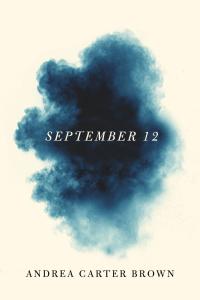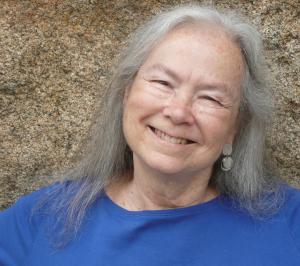"September 12" is One Survivor’s Testimony of 9/11’s Enduring Impact
In her new collection of poems "September 12" published for the 20th anniversary of 9/11, Andrea Carter Brown recounts her experience of the terrorist attacks.
Reading September 12 is a wrenching but restorative experience you won’t soon forget.”
LOS ANGELES, CA, UNITED STATES, September 1, 2021 /EINPresswire.com/ -- On the morning of September 11, 2001, poet Andrea Carter Brown was drinking coffee in her Lower Manhattan apartment when the phone rang. The call came from her sister, who had just watched on television as a plane hit the World Trade Center a block away from Brown’s apartment. After running to the window to see smoke and flames, she fled her home on foot and escaped the city on a circuitous route to Westchester, not knowing if or when she would return. While she was crowded onto the Staten Island Ferry leaving Manhattan, a dark cloud engulfed the world: the first tower had fallen. — Martha Collins, poet
In her new collection of poems "September 12" (September 1, Word Works Books), published for the 20th anniversary of 9/11, Brown recounts her experience of the terrorist attacks from the initial shock to the haunting grief and loss that followed. “I still can’t believe the kids went to school September 12,” she writes in “How to Make an American Flag,” gesturing toward 9/11’s enduring impact beyond a single harrowing day. Brown knows this impact firsthand. It was six months before her contaminated apartment was remediated, years before chronic health problems caused by dust and other toxins could be controlled, and her traumatic recollections of the attacks remain ever-present. “The details of that day are indelibly etched in my memory. Many are still as vivid as they were then. Some are finding their way to the surface to this day.”
When other New Yorkers began to document 9/11, Brown realized that she experienced the tragedy from a singular angle, adding a unique perspective to the collection of survivors’ testimonies. Her first poems responding to the disaster, “The Old Neighborhood” and “Ash Wednesday,” were written the following year and published in "Poetry After 9/11: An Anthology of New York Poets". Throughout the next two decades, the project that became "September 12" grew to encompass more facets of the personal, local, and global impacts of 9/11. Brown’s eyewitness account became a haunting prose poem from which the collection takes its title, chronicling her escape from Lower Manhattan. Later, a sequence of minimalist sonnet portraits emerged honoring the ten people killed from Brown’s hometown of Glen Rock, New Jersey— a community with one of the highest victim counts of the surrounding suburbs. She also found herself reaching back to before the destruction, writing historical poems about New York City and lyrical interludes about life overlooking the harbor in Lower Manhattan. And she looked forward, creating an extended section of aftermath poems documenting 9/11’s rippling effects. New York State poet laureate Alicia Ostriker notes that in "September 12 the experience lives on and on, through shock and terror, through the kindness of strangers, through the heart of a beloved, through grief and elegy, through normality that will never again be normal.”
Poems from "September 12" have been honored with the James Dickey Prize from Five Points journal, River Styx International Poetry Prize, and the National Poet Hunt from The MacGuffin. The poem “The Old Neighborhood” was featured on NPR and cited in the Library of Congress Online Guide to the Poetry of 9/11. Split This Rock, an organization recognizing poetry that bears witness to injustice, also featured “After the Disaster: Fragments.” Poet Martha Collins describes "September 12" as “wrenching but restorative,” pointing to the power of Brown’s poetry to heal as well as to witness. Her work has inspired readers and listeners, often strangers, to share their own stories of September 11: where they were, what happened to them, how they heard the news. “I won’t say it’s been easy,” Andrea Carter Brown in a guest article for Five Points. “It’s been a long, slow, ongoing process of discovery. And recovery.”
ABOUT THE AUTHOR:
Andrea Carter Brown is the author of The Disheveled Bed and two chapbooks, "Domestic Karma" and "Brook & Rainbow", winner of the 2001 Sow’s Ear Press Chapbook Prize. Poems from "September 12" won the James Dickey Prize from "Five Points", the River Styx International Poetry Prize, and the National Poet Hunt from "The MacGuffin". They are cited in the Library of Congress Online Guide to the Poetry of 9/11 and have been featured at Split This Rock and on NPR. “American Fraktur” won the Rochelle Ratner Memorial Prize from Marsh Hawk Press. Formerly a Founding Editor of "Barrow Street" and Managing Editor of "The Emily Dickinson Journal", she is currently Series Editor of The Word Works Washington Prize. An avid birder, she lives in Los Angeles, where she grows lemons, limes, oranges, and tangerines in her backyard.
ABOUT THE BOOK:
"September 12" was published by Word Works Books on September 1, 2021. It can be purchased in paperback at $20.00 from The Word Works, Inc., Small Press Distribution, or your local bookstore.
REVIEW COPIES AND MEDIA INTERVIEWS:
To request a review copy of "September 12" or to schedule an interview/event with Andrea Carter Brown, contact publicist Nanda Dyssou of Coriolis Company at nanda@corioliscompany.com or 424-226-6148.
Nanda Dyssou
Coriolis
+1 424-226-6148
nanda@corioliscompany.com
Legal Disclaimer:
EIN Presswire provides this news content "as is" without warranty of any kind. We do not accept any responsibility or liability for the accuracy, content, images, videos, licenses, completeness, legality, or reliability of the information contained in this article. If you have any complaints or copyright issues related to this article, kindly contact the author above.


